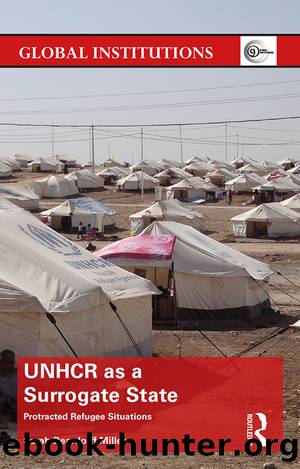Unhcr as a Surrogate State: Protracted Refugee Situations by Sarah Deardorff Miller

Author:Sarah Deardorff Miller [Miller, Sarah Deardorff]
Language: eng
Format: epub
Tags: Political Science, General
ISBN: 9781315456799
Google: 5uE2DwAAQBAJ
Goodreads: 36760189
Publisher: Routledge
Published: 2017-09-22T00:00:00+00:00
Why it stays a surrogate state
You donât make a lot of money off ⦠âresponsibilizingâ the government ⦠where you make a lot of money is substitution [for the government].65
A number of factors offered by the framework help explain why UNHCRâs surrogacy in Kenya perseveres. At the very least, UNHCR and the GoK maintain surrogacy as long as it is in their interest. As noted on p. 84, Kenya continues with the status quo because it is happy to have UNHCR both carry out the work and pay for it as well. Also, after years of UNHCR carrying out refugee protection, the GoK may have little knowledge and expertise on the subject and may not have staff well trained to take over. Thus, UNHCR has created a niche for itself that the government has lost the opportunity in which to grow.
For its part, UNHCR, though outwardly reluctant to take on surrogacy, has an interest in pleasing its donors and thus does not want to appear to be scaling back from any projects. On the contrary, expansion is what brings in new funds, which makes going beyond the refugee protection mandate tempting. One UNHCR official stated that UNHCRâs current role in Kenya and in other PRS puts UNHCR in a difficult place, as it becomes the key resource mobilizer, continually failing to âresponsibilizeâ the government. He claims that within the organization, âit is not really rewardedâ to truly seek solutions that empower the government to make sure that âI will not be necessary.â In other words, technically speaking, humanitarians should seek to âput themselves out of a job,â but the organization does not always carry on this way, instead taking on more and more. He continues, âThatâs why in Kenya, which is quite stable [and thus capable of responding to refugees], you will have âcapacity-buildingâ for 20 yearsâ as opposed to turning over responsibilities to the GoK.66 In other words, to âstay in business,â UNHCR may not always seek solutions that would put an end to their operations in Kenya.
This relates directly to arguments that UNHCRâs structure makes it difficult to downsize once it has expanded. As noted earlier, scholars like Barnett and Finnemore (1999) argue that this is true in bureaucratic organizations like UNHCR, which are often wired to continually seek expansion. One NGO official interviewed even talked about UNHCR being like a big oil tanker that is very difficult to turn around once it is moving in one direction: âthe captain can try to turn the wheel, but it is going to be a long, gradual turn, and one will not see results for a long time.â67 Thus, part of the reason UNHCR maintains its surrogate state role in Kenya relates to both what is in its interest and in its nature.
He also notes that protracted cases generate money for UNHCR and donors sitting on funds that need to be used and that âresponsibilizingâ governments instead does not bring in as much money. As noted earlier, he states, âYou
Download
This site does not store any files on its server. We only index and link to content provided by other sites. Please contact the content providers to delete copyright contents if any and email us, we'll remove relevant links or contents immediately.
The Secret History by Donna Tartt(19048)
The Social Justice Warrior Handbook by Lisa De Pasquale(12187)
Thirteen Reasons Why by Jay Asher(8893)
This Is How You Lose Her by Junot Diaz(6877)
Weapons of Math Destruction by Cathy O'Neil(6264)
Zero to One by Peter Thiel(5786)
Beartown by Fredrik Backman(5737)
The Myth of the Strong Leader by Archie Brown(5498)
The Fire Next Time by James Baldwin(5431)
How Democracies Die by Steven Levitsky & Daniel Ziblatt(5213)
Promise Me, Dad by Joe Biden(5141)
Stone's Rules by Roger Stone(5081)
A Higher Loyalty: Truth, Lies, and Leadership by James Comey(4951)
100 Deadly Skills by Clint Emerson(4920)
Rise and Kill First by Ronen Bergman(4779)
Secrecy World by Jake Bernstein(4740)
The David Icke Guide to the Global Conspiracy (and how to end it) by David Icke(4701)
The Farm by Tom Rob Smith(4502)
The Doomsday Machine by Daniel Ellsberg(4484)
